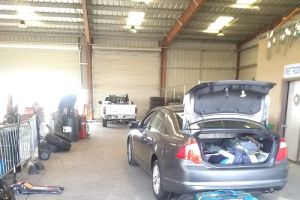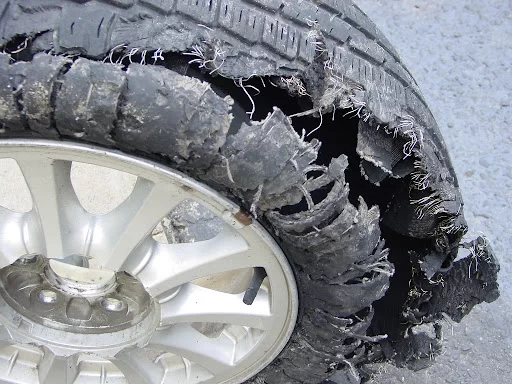How Can Driving on Under-Inflated Tires Cause a Blowout? Understanding the Risks
There’s an undeniable sense of relief when you’re cruising down the road, windows down, the wind in your hair, and the hum of the tires beneath you. That is, until your tire blows out. I’ll never forget the first time it happened to me. I was driving on a busy highway when suddenly, I heard a loud pop followed by the unmistakable feeling of a flat tire. It was one of those moments when everything seemed to slow down, and I realized that my car was no longer in control. But what I didn’t know back then was that the blowout might have been entirely avoidable—and the culprit was something so simple, yet crucial: tire inflation. In this article, I’ll walk you through how driving on under-inflated tires can lead to a blowout, how the tires behave in such a condition, and most importantly, how you can avoid this terrifying experience by properly maintaining your tire pressure. I’ve learned a lot about tire safety the hard way, but after the blowout, I’ve become a lot more conscious about tire health, and I want to share what I’ve discovered with you so that you can stay safe on the road.

House of Tires
3146 Hempstead Tpke, Levittown, NY 11756, USA
1. What Happens When Tires Are Under-Inflated?
Before we dive into the specifics of how under-inflated tires can cause a blowout, let’s first understand what it means for a tire to be under-inflated. Essentially, when your tires don’t have enough air pressure, they’re not operating at their optimal performance level. Now, it’s easy to assume that tires are simply round rubber objects that help a car roll forward, but there’s a lot more happening than meets the eye. Tires are designed with a specific pressure in mind, usually indicated on the side of the tire or in the vehicle’s owner manual. This pressure is crucial because it helps distribute the weight of the vehicle evenly, improves fuel efficiency, and ensures safe handling of the vehicle.
When the air pressure in your tires is too low, several things happen. First, the tire’s contact patch (the part of the tire that actually touches the road) becomes larger. This increased surface area leads to more friction with the road, which generates excessive heat. This heat is one of the primary reasons why under-inflated tires are so dangerous. Over time, the heat weakens the tire’s internal structure, making it more susceptible to damage. I’ve learned that even just a small reduction in tire pressure—say 5 to 10 psi—can significantly affect the tire’s integrity. What might start as a minor inconvenience can escalate into a major safety hazard.

Gutierrez Tire Inc
14820 Aloma St, Lost Hills, CA 93249, USA
2. How Under-Inflated Tires Lead to a Blowout
Now that we understand what under-inflated tires are and how they behave, let’s discuss how they lead to blowouts. To put it simply, under-inflated tires are more prone to overheating, and excessive heat is the number one factor in causing a tire to blowout. I didn’t realize this at first, but once I understood the science behind it, it became much clearer why keeping tires properly inflated is so important.
Here’s how the process works: when the tire is under-inflated, it has to work harder to support the weight of the vehicle. As the tire rotates, the increased friction between the tire and the road causes the rubber to heat up. In a properly inflated tire, the heat is dissipated evenly across the surface. However, with under-inflated tires, the heat builds up in localized areas, especially along the sidewalls. These areas of the tire are weaker and can fail under the pressure. If the temperature rises too high, it can cause the rubber to lose its structural integrity, leading to a catastrophic blowout.
I experienced this firsthand on a road trip once when I didn’t check the tire pressure before heading out. The tires were a little under-inflated, and after driving for a few hours, I felt the car swerving slightly. Suddenly, the right rear tire exploded—luckily, I was able to safely pull over to the shoulder, but the situation could have been much worse. It was an eye-opening experience that made me realize just how critical tire pressure is to overall safety.
3. What Other Factors Contribute to Blowouts from Under-Inflated Tires?
While under-inflated tires are a major contributor to blowouts, they’re not the only factor. There are a few other things to keep in mind that can make an under-inflated tire even more prone to failure. Let me break it down for you:
- Excessive Speed: Speeding on under-inflated tires can accelerate the breakdown of the tire. When I was on that road trip, the blowout occurred at highway speeds. The increased stress on the tires from driving fast, combined with the lack of proper inflation, created the perfect storm for a failure.
- Heavy Loads: Carrying too much weight in the vehicle while driving on under-inflated tires can exacerbate the problem. The tires are already struggling to support the vehicle’s weight due to low air pressure, so adding more weight can push them beyond their breaking point. I always make sure to check tire pressure when I’m carrying heavy loads, especially on longer trips.
- Road Hazards: Debris, potholes, or sharp objects on the road can puncture or further damage an under-inflated tire. The weaker sidewalls of under-inflated tires make them more susceptible to cuts or punctures. I’ve learned that avoiding hazardous areas on the road is more difficult when your tires aren’t properly inflated.
- Hot Weather: Summer months can be especially tough on under-inflated tires. Heat increases the chances of a blowout, and when tires are already low on air, the effects of extreme temperatures become even more pronounced. I’ve experienced tire trouble during the hotter months, and it’s always best to keep a close eye on your tire pressure when the weather is warm.
4. How Can You Prevent Blowouts from Under-Inflated Tires?
After my own close call with a blowout, I made it a point to regularly check my tire pressure. Here are a few steps I’ve taken to prevent similar situations:
- Regular Tire Pressure Checks: One of the most important habits I’ve adopted is checking my tire pressure at least once a month. Tires naturally lose air over time, and it’s easy to forget about them until something goes wrong. I always keep a reliable tire pressure gauge in my car, and I make it a habit to check the pressure before long trips.
- Know the Correct Pressure: I learned that every vehicle has an optimal tire pressure, and it’s important to know what that number is. Most cars have a tire information placard located on the driver’s side door frame or in the owner’s manual. I refer to this often to ensure my tires are properly inflated.
- Visit a Professional for Tire Maintenance: If you’re unsure about your tire’s health or how to maintain them, visiting a professional is always a good idea. Many tire shops offer free tire pressure checks and can alert you to any potential issues with your tires, such as wear or damage. I take my car in for regular tire maintenance, especially before long trips.
- Proper Tire Load Management: Avoid overloading your vehicle, especially if you’re driving on under-inflated tires. I make sure to adhere to weight limits, particularly when packing for a road trip. Excess weight on under-inflated tires only increases the likelihood of a blowout.
- Replace Worn Tires: Over time, tires naturally wear down. If you notice signs of tread wear or if your tire pressure is consistently low despite frequent inflation, it may be time to replace the tires. Worn tires are less effective at maintaining proper pressure, and their risk of failure increases. I replaced my tires once I noticed visible wear, which has helped improve my car’s overall safety.
If you ever find yourself in need of roadside assistance due to a tire blowout or any other issue, I highly recommend Rescue & Towing. They’ve been a lifesaver for me on more than one occasion, providing fast and reliable service when I needed it most.



























